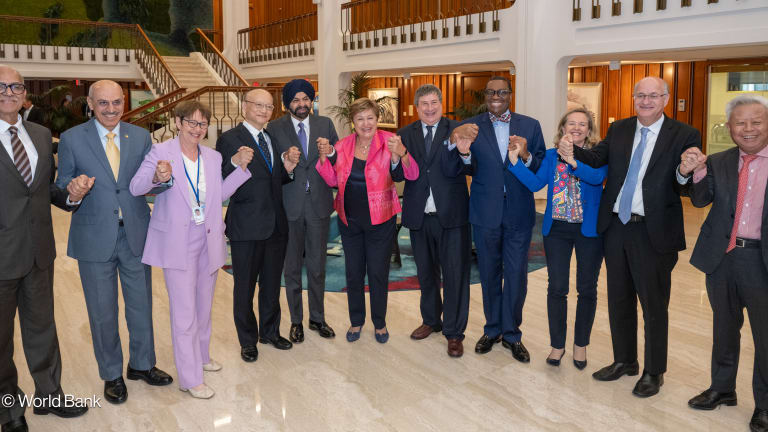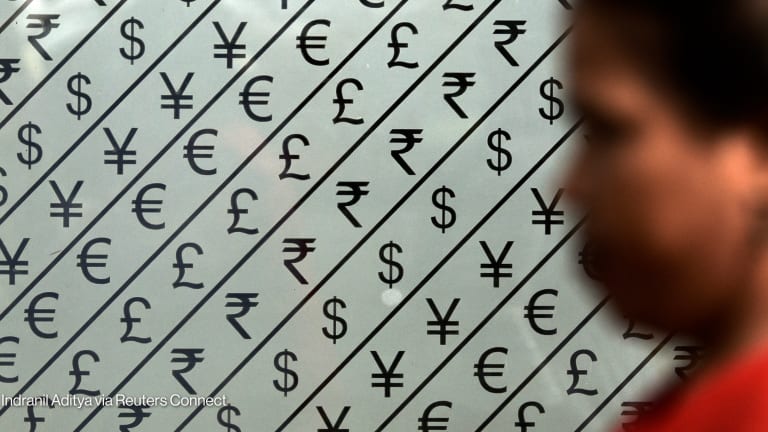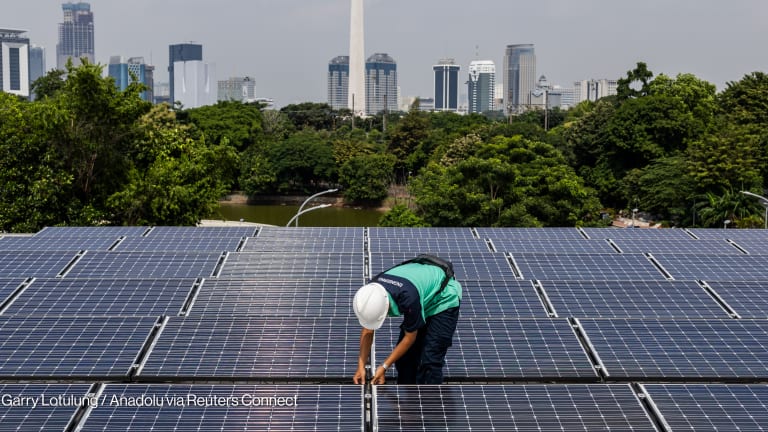
WASHINGTON — New guidance from the United States government which appears to encourage multilateral development banks to invest in fossil fuel projects in developing countries has been met with dismay from development experts and climate change campaigners.
The administration of President Donald Trump published the new Treasury Guidance for U.S. Positions on Multilateral Development Banks Engaging on Energy Projects and Policies last month. The brief directive — spanning only a few sentences — instructs U.S. representatives on the executive boards of MDBs to vote to “help countries access and use fossil fuels more cleanly and efficiently.”
Experts say that this means voting “yes” to most future coal projects that come up for approval. These would previously have been turned down under guidance brought in by President Barack Obama in 2013, which made it difficult to use public resources to support coal projects except in rare circumstances.
The move comes in the wake of Trump’s decision to withdraw the U.S. from the Paris Agreement on climate change and is part of his broader strategy to revive the U.S. coal industry, make the country “energy independent,” and become a gas and coal exporter, as laid out in a speech delivered at the Department of Energy in June. He is also working to end coal power plant regulations introduced by former President Obama, which coal supporters claim have decimated thousands of mining jobs in the U.S.
With the U.S. as largest shareholder at the European Bank for Reconstruction and Development, the Asian Development Bank, the World Bank and the African Development Bank, it could mean more coal power projects gaining approval. Supporters argue this would bring greater energy access to poor countries.
However, others say that MDBs — especially the World Bank — and developing countries are moving away from coal power in favor of clean technologies, and that they are unlikely to have the appetite for new coal plants. Experts who spoke to Devex suggested that the gesture is purely political, and is unlikely to translate into more MDB-backed coal power plants.
Pro-poor policy or political posturing?
Coal has long been a source of controversy for the MDBs. Tasked with helping developing economies to advance, they find themselves open to environmental criticisms for financing coal power plants. On the other hand, they can be accused of imposing unfair restrictions which did not apply to developed countries if they insist on renewable solutions.
Dan Runde, director of the Project on Prosperity and Development at the Center for Strategic and International Studies, a Washington, D.C., think tank, supports the Trump administration’s pro-coal policy, which he says is good for both the U.S. and developing countries.
“The Trump administration is choosing a pro-poor and pro-U.S. jobs position by supporting MDB-financed coal projects. This is great news,” he said. Allowing developing countries to mine and burn their coal is fair, he added: “These poor countries are going to use their coal resources just as the U.S. and other rich countries do.”
However, other experts questioned the likely implications of the new guidance. “It’s symbolic,” according to Steve Herz, senior international policy adviser at the U.S. environmental advocacy group, the Sierra Club, who added, “They [the Trump administration] want to be seen as supporting the coal industry even though they’re not doing anything which could really revive it… [and] they want to be seen to be undoing steps that the Obama administration took.”
Alex Doukas, program director at Oil Change International, an advocacy and research group which campaigns against the use of fossil fuels, described the updated guidance as “a massive step backward” but said that other world leaders are unlikely to follow suit. “The good news is that outside of Trump's own little world, the trends are moving in only one direction, and that's away from fossil fuels,” he said.
Herz agreed, noting that major MDB shareholders including the United Kingdom, the Netherlands, and the Nordic countries have all adopted guidelines to promote clean energy.
Furthermore, if Trump is hoping to turn the U.S. into a coal exporter, encouraging developing countries to seek financing for their own coal plants looks like an illogical step, according to Leonardo Martinez-Diaz, global director of sustainable finance at the World Resources Institute.
“The U.S. is neither a leading supplier of coal power plant technology, nor is it the only coal exporter … By pushing countries to finance more power plants that are coal-based, the U.S. is not going to be exporting any coal or coal technology,” he said.
Is there demand from developing countries?
See more related topics:
► Former top Treasury officials cautiously optimistic that Trump will come round to the MDBs
► A look into ADB's future climate change work
► Trying to sway the Trump administration on climate change
► How to reframe climate programs in an era of climate denial: Lessons from Australia
CSIS’s Runde argued that emerging economies such as India “want these coal projects financed,” and that if enough influential shareholders — namely Japan and the U.S. — support it, the World Bank and the ADB will be forced to comply. “If Japan and the U.S. plus poor countries encourage this policy at the board level, it will happen,” he said.
But others told Devex that recent evidence suggests it won’t. According to former U.S. Treasury Under Secretary for International Affairs Nathan Sheets, who advised Treasury secretaries under President Obama on working with the MDBs, the Trump administration’s position is unlikely to result in an “upward spike in coal-based projects” because “there simply isn't international support for a move in that direction.” At the recent G-20 meetings in Germany, 19 countries, including China, India and Japan stood by the Paris Agreement despite the US’s withdrawal.
This trend is driven by more than just politics, said Herz. The decreasing cost and the enhanced efficiency of renewable alternatives to coal, as well as concerns about the health risks associated with burning it, are making coal a less attractive investment proposition.
Even India, formerly one of the world’s biggest coal importers, is moving away from this type of energy, estimating that nearly 60 percent of its energy will come from non-fossil fuel sources by 2027, and that no new coal-fired power stations will be built until that time, Herz pointed out. “I’d be shocked if India went to the Asian Development Bank in the near future asking for finance for coal,” he said.
What MDB financing can and should be used for is another consideration for both lending and borrowing countries according to Martinez-Diaz. “This isn’t just about a bunch of rich countries saying you shouldn’t fund coal — there’s been a change in the demand patterns of borrowers too,” he said. Since coal financing is generally commercially available, developing countries are increasingly seeing MDB financing as “far more usefully employed” on riskier, unproven projects which private backers shy away from, he explained.
“The U.S. alone cannot … generate demand for projects if borrowers don’t want to submit those projects in the first place,” he said.
Former Treasury Under Secretary Sheets agreed, saying that “the banks … will remain active in advancing new technologies and approaches in the power sector and in many other project areas,” rather than returning to coal.
World Bank U-turn seems unlikely
Not long after the Obama administration released its coal guidelines in 2013, the World Bank came out with a new energy strategy which endorsed the same approach: Coal-fired power stations would only be financed in “rare circumstances,” such as when no other viable source of energy exists.
World Bank accused of incentivizing investments in fossil fuels through $5B policy loans portfolio
A new report has said the World Bank is contradicting its own climate change policies by funding policy reforms that effectively subsidize the coal industry in Mozambique, Indonesia, Peru and Egypt. The bank strongly denies the claim and says the Bank Information Center, who wrote the report, "grossly misrepresent" their engagement in the countries.
This marked a dramatic shift in policy for the institution and was spearheaded by its newly-appointed head at the time, Jim Kim. Kim succeeded in getting the no-coal policy approved by the board where others had failed due to opposition from China, India, and Saudi Arabia — and “burned political capital” on the issue, according to Martinez-Diaz.
He described Kim as a “pioneer in this area, taking a strong position when some inside and outside the bank were not yet ready to move.” Having risked so much to move the bank away from coal, it seems unlikely that Kim would be willing to see the position reversed on account of a brief guidance note from the Trump administration, he suggested.
In a statement emailed to Devex, a spokesperson for the World Bank confirmed that the institution’s position on coal financing “remains unchanged.” Kim has also been outspoken about his commitment to using bank funds to help countries divest from coal. Speaking to ministers during the bank’s Annual Meetings in Washington, D.C., last October, he said that: “Many countries want to move in the right direction. We can and should all help to find renewable energy and energy efficiency solutions that allow them to phase out coal.”
However, Runde argued that the World Bank may be forced to change its approach in order to secure funding from the U.S. for its main lending window — the International Development Association — which is waiting to learn how much of the $1.3 billion replenishment it was promised under the Obama administration will come through.
The U.S. contribution is decided by Congress, with the House Appropriations Subcommittee on State and Foreign Operations having a key influence. Since the current chair of the subcommittee, Republican congressman Hal Rogers, is a vocal supporter of coal, the World Bank’s position on this issue could influence the IDA total, Runde suggested.
Coal or no coal, the MDBs are still fuelling climate change
However, even if the new U.S. guidance does not lead to increased coal financing from the MDBs, critics argue that the World Bank and others are nonetheless continuing to fund other energy supply projects that contribute to carbon emissions, such as energy extraction, conversion, storage, transmission and distribution.
According to new research by the World Resources Institute, between 2015 and 2016 the World Bank, International Finance Corporation and ADB approved nearly 300 such energy supply projects, of which more than half could be categorized as “conditional,” meaning it is unclear whether they are in line with the 2 degrees Celsius global temperature rise target set by the Paris Agreement. Martinez-Diaz questioned whether — despite apparent anti-coal stances in recent times — the MDBs are “helping the world to a low carbon future.”
Herz agreed, pointing to recent research that shows that even if coal production stopped, burning the oil and gas already being produced would be enough to take temperature rises above 2 degrees Celsius. “Against that backdrop, why would the World Bank finance continued production [of fossil fuels] which cannot be safely burnt?” he asked. This is a “disconnect which they have never addressed.”
Read more international development news online, and subscribe to The Development Newswire to receive the latest from the world’s leading donors and decision-makers — emailed to you free every business day.








